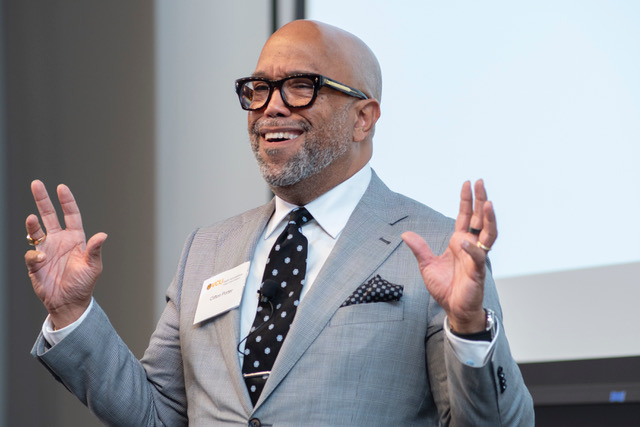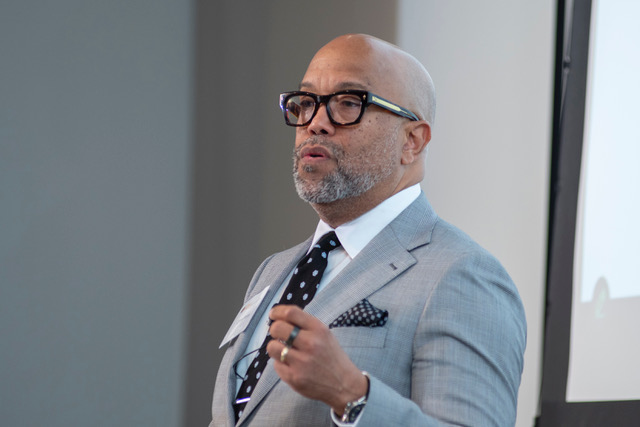Clif Porter VCU ‘86 challenges next generation of health leaders to focus on workforce
Among the various challenges facing tomorrow’s health care, perhaps the biggest and toughest issue for future administrators to solve is building and retaining a qualified workforce.
That was the key message from Virginia Commonwealth University alum Cllfton Porter, senior vice president of government relations for the American Health Care Association. He directed his comments largely to current students and future health care leaders in the room, sharing his more than three decades of experience in long-term care and a career rooted in advocacy and policy.
Porter returned to VCU’s Department of Health Administration in early April to deliver the 2025 Paul A. Gross Landmarks in Leadership Lecture, “Leadership Mandate: The Healthcare Workforce Imperative.”
Porter’s message was clear: The future of health care is in the hands of these students, and the challenges ahead require their ingenuity, empathy and leadership.
 As he took the stage, the 1986 VCU health care management alum set a reflective and authentic tone. “You were made to be here,” he said. “And that’s good.” He acknowledged competing demands on their time but emphasized the importance of their presence – not just in the room, but in the field.
As he took the stage, the 1986 VCU health care management alum set a reflective and authentic tone. “You were made to be here,” he said. “And that’s good.” He acknowledged competing demands on their time but emphasized the importance of their presence – not just in the room, but in the field.
“You’re our future,” he said. “There are lots of problems in the health care system that people my age and stage haven’t figured out yet. It’s going to take a different kind of thinking.”
Porter’s career began in 1989 as an administrator-in-training at a skilled nursing facility. From there, he advanced through various operational roles, eventually leading government relations for HCR ManorCare (now ProMedica Senior Care) and playing a critical part in securing billions of dollars in relief for the long-term care sector during the COVID-19 pandemic. With AHCA, he represents more than 14,000 nonprofit and proprietary nursing homes, assisted living communities, and facilities for individuals with intellectual and developmental disabilities.
Yet his message to students was not about accolades; it was about purpose.
Porter called attention to one of the most pressing issues in health care today: the workforce crisis. “We have an aging population, and the number of people over the age of 85 will double in the next 15 years,” Porter said. “Twenty percent of them will need long-term care. That’s millions of people. And we don’t have the workforce to meet that demand.”
Porter painted a stark picture, noting that the number of 18- to 45-year-olds – whom he dubbed the “strong back, good knee” demographic – is declining. In 2025, there will be 6.5 million fewer people in this age group than there were in 2020. By 2047, when Porter turns 80, there will be just three working-age adults available to support each senior.
“That mortifies me,” he said, only half-joking.
The crisis is exacerbated by burnout and attrition.
- Porter cited data showing that 193,000 nursing positions open each year, driven by both growing demand and a wave of retirements.
- More than 100,000 registered nurses left the workforce during the pandemic, and an additional 600,000 plan to retire in the coming years.
- The cost of turnover is staggering: up to $5.8 million annually for a single hospital system and $56,000 to replace one nurse.
What’s the solution?
 For Porter, it starts with leadership.
For Porter, it starts with leadership.
“The most important thing you can do is to become a premier leader of people,” he said. “Yes, you need to understand operations, finance and metrics. But above all, you need to know how to attract, retain and inspire people.” He underscored the role of empathy, flexibility, and mentorship in building teams that not only deliver quality care but also feel valued and supported – which becomes the critical ingredient in keeping people when salary dollars are limited.
He shared stories from his own career that brought those principles to life – such as the snowstorm in the 1990s when, as a nursing home administrator, he and his team packed bags and stayed at the facility for days to ensure residents were cared for. Or the elderly resident, Mr. Robinson, who remembered him not for his title or policy work, but for simply bringing him water every day. In his final days, Mr. Robinson asked for Porter to visit. “He said to me, ‘Clif, thanks for the water.’ And I still cry about that,” Porter recalled. “That’s meaningful work.”
Porter also challenged students to remain engaged in public policy. “You can’t put your head down and ignore it,” he warned. “Policy shapes everything from reimbursement to regulation. If you’re not at the table, you’re on the menu.”
He also addressed the current political climate, expressing concern about policies that hinder immigration and threaten the ability to retain and bring in qualified health care workers from abroad. “We do not have enough Americans domestically to meet the demand,” he said, noting that he focuses on facts and not either political side. “We need common-sense immigration policy that treats health care workers the way we treat engineers and tech talent.”
Find your stories
Throughout the evening, Porter’s passion for long-term care was evident. He encouraged students to consider careers in his beloved field, reminding them that while it might lack the glamour of high-tech hospitals, it offers unparalleled opportunity for leadership, growth and impact. “You’ll always have a job,” he said with a smile. “And you’ll have stories – stories that stay with you forever.”
In closing, he returned to a simple but profound message: Be human. “The most important trait of leadership isn’t something you learn in a textbook: It’s being a good person. Listen. Have empathy,” he said. “Tell your stories.”
By Kyra Newman